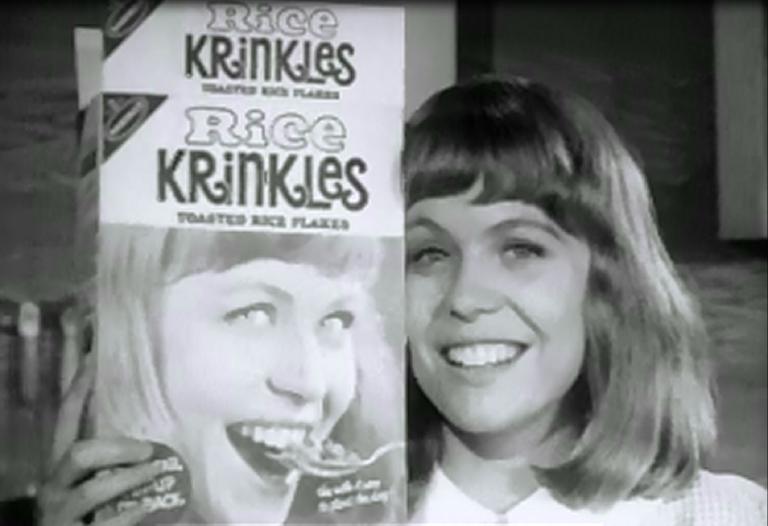
Jacki Weaver advertising Rice Krinkles
Still of Jacki Weaver in a 1965 television commercial for Rice Krinkles.
This commercial for the Nabisco-owned breakfast cereal Rice Krinkles features an 18-year-old Jacki Weaver.
Weaver made her professional debut in the theatre, and by the mid-1960s, she had made special appearances on Bandstand and was cast in the Aboriginal-themed ABC children's progran Wandjina! She was also known for her romantic relationship with singer Bryan Davies. At the time she appeared in this commercial, Weaver was a star on the rise, with a fresh look reminiscent of Hollywood performer Ann-Margret. She'd go on to have a remarkable career on Australian film, starting with Stork in 1971. Her career would reach new heights following her Academy Award nomination for Best Supporting Actress in 2010, for her work in the Australian crime drama Animal Kingdom - which she followed up with a second nomination in 2012, for Silver Linings Playbook.
In the early days of contemporary advertising (glamourised in the award-winning American drama Mad Men), corporate brands identified the teenage market as a growing business opportunity, and recurred to pop stars as a way to enter the world of youth culture. In advertisements such as this, the main focus was not on the features of the product (for example, nutritional value) but on its coolness. This is not just a box of cereal, it's the 'with-it way to start the day'.
Produced in the USA by Post Cereals and Nabisco in Australia, Rice Krinkles are briefly described by the narrator as delicious, but most importantly, those who bought the product would also be able to learn the hottest dance steps from Weaver herself, as well as collect memorabilia of popular bands such as The Easybeats. Beatlemania was at its peak, leading the way in which music artists could expand their brand beyond records and concerts, and partner with corporations to sell any product imaginable.
In this 30-second advertisement, Jacki dances her way around a modern-looking kitchen. The music is generic, but reminiscent of the pop hits of the day. Not only is Weaver the star of the advertisement; the message is reinforced in-store by having her face on the actual box, smiling back at its potential customers from the supermarket shelves it adorned. It was a mutually-beneficial arrangement; the brand hoped to become 'cool' by association, while the star gained valuable exposure.
While 21st century pop stars would very likely be reluctant to be associated with sugary products, the corporate sponsorship model is still a fundamental piece of the pop culture industry.
The National Film and Sound Archive of Australia acknowledges Australia’s Aboriginal and Torres Strait Islander peoples as the Traditional Custodians of the land on which we work and live and gives respect to their Elders both past and present.



